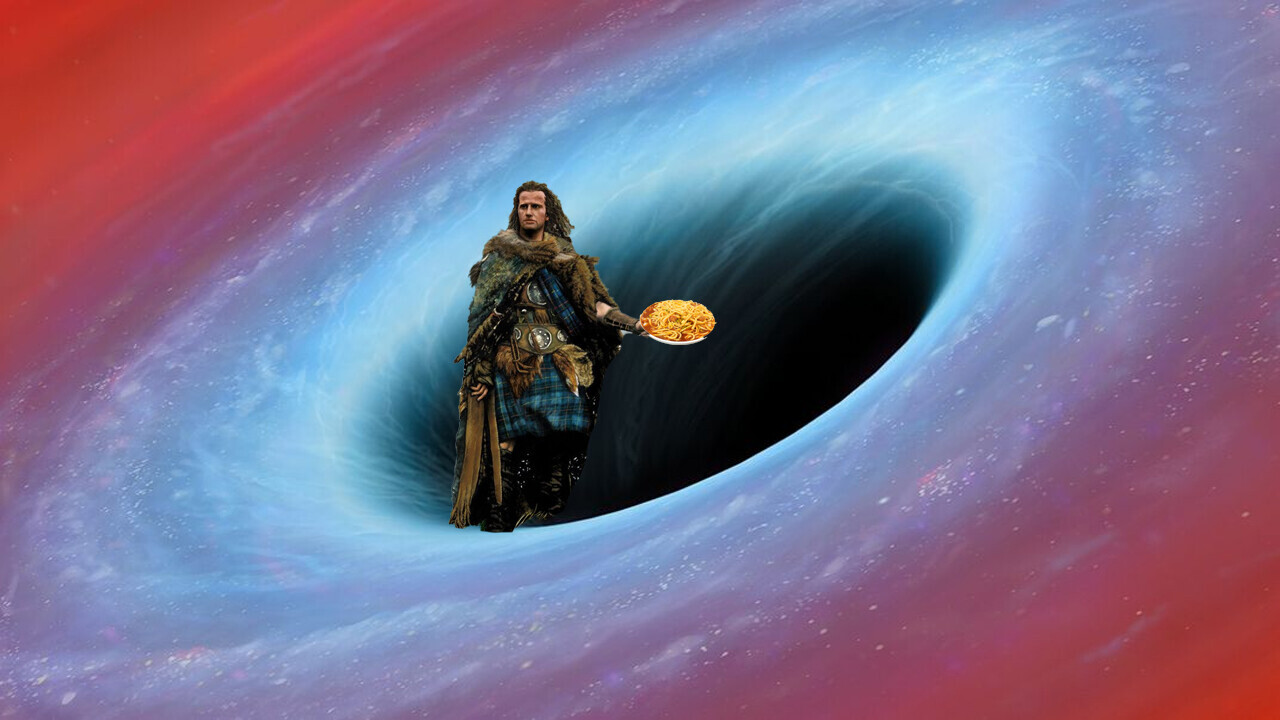
Has this ever happened to you? You’re cavorting through deep space at near the speed of light without a care of the world when, suddenly, you realize you forgot to replace the toner cartridge in your office printer back on Earth before you left.
Rather than face your disappointed co-workers after such an unforgivable oversight, you decide it would be best if you just stopped time and waited for them all to die before you return to work.
So, like any space traveler hip to the works of Albert Einstein, you decide to park your spaceship at the perfect edge of a black hole.
What happens next?
Nothing good, that’s what. But it’s a lot of fun to talk about.
Einstein’s theory of general relativity tells us that an object placed perfectly at the edge of a black hole’s event horizon should be able to maintain a temporal dissonance.
In other words: a sufficiently strong gravitational pull such as that exhibited by a black hole should warp spacetime around it. If you were standing near the edge of a black hole and your buddy flew by in their spaceship, in the time it took for you to wave at them they’d have potentially aged by weeks, months, or even years.
And that’s because time is a vague concept used by physicists to explain the systemic changes which occur in our universe.
If we lived in total nothingness, nothing would ever happen, and there could be no concept of time. But, because things happen in the universe we live in, we use time to explain the observable differences between both similar and disparate events.
What’s awesome about things in the universe that have enough mass to have gravity is that they can actually change our experience of time.
If you’re on the Earth, time goes a tiny bit slower than if you’re inside a spaceship in deep space. And, because black holes are the most massive things we know of, time can theoretically come to a perfect stop once you’re close enough to a singularity’s event horizon.
Stopping time? Seriously?
Think of time like the needle on a record player. When you play a record at the right speed, it should sound the way it’s supposed to – it rotates in “normal” time. But if you put your thumb on the record as it’s spinning and press down with just enough force, you can cause the platter to slow down and distort the audio. It’ll sound as though time itself has slowed down.
And, with sufficient pressure, you can stop the album from spinning altogether. That’s pretty much how the theory of general relativity works.
A black hole should be able to warp spacetime sufficiently that someone standing in the perfect spot would experience time in a way exclusive from the rest of the universe.
In a way, this would make you immortal. But you’d never know it. Unfortunately for you and your crew, you’d all live relatively normal lives and eventually die of old age. A minute would feel like a minute, a year would feel like a year, and so on and so forth.
However, the entire universe outside of the black hole might experience thousands or millions of years in the time it takes you and your crew to grow old and die.
So, it’s slightly plausible to think you could time things just right. With sufficiently advanced quantum computers and spacetime plotting systems (the latter is something I just made up) it’s theoretically possible that we could punch in some numbers, navigate to the perfect spot at the edge of a black hole, and wait out our co-workers lifespans before zipping back to the Earth in what would feel like just a few hours to us.
But the whole spaghettification issue might pose a problem.
Spaghetti is… delicious?
Only if you eat it. Becoming spaghetti is almost certainly not yummy.
At some point between the outside of a black hole and the area of space surrounding it that’s affected by its gravity, an object starts to feel the pull of the black hole.
This is a kind of gravity we’re not use to dealing with. When you jump up in the air and fall back down here on Earth, that’s gravity pulling on your mass. But when you dial that up to black hole levels, gravity starts pulling on your individual atoms.
Eventually, any matter that gets close enough to a black hole’s event horizon will begin to stretch and distort until it looks like a flat, elongated piece of pasta. That means the individual cells in your body and the teeny, tiny things those cells are made of end up looking like wet space noodles.
So there you have it. Parking your spaceship at the perfect edge of a black hole’s gravitational pull will either make you ‘technically immortal’ without actually bestowing any of the health benefits of immortality (such as not ever dying) or it’ll turn you into cosmic spaghetti.
Get the TNW newsletter
Get the most important tech news in your inbox each week.




